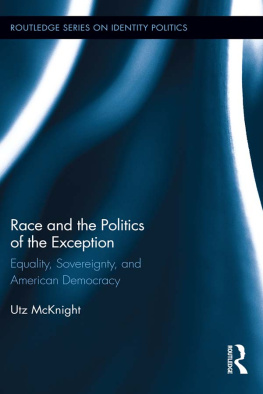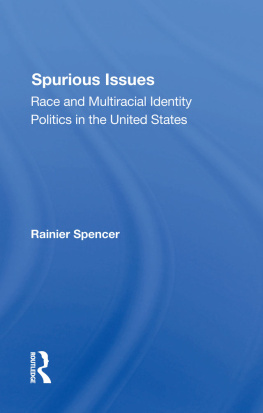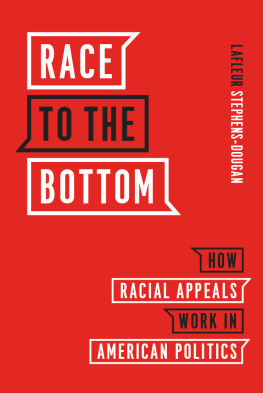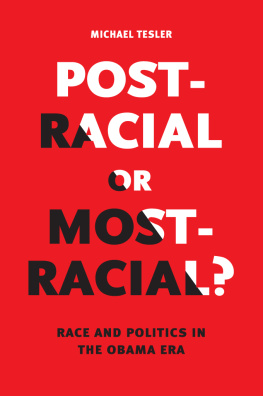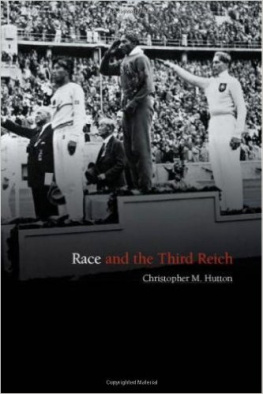If the election of Barack Obama signaled that Americans had embraced the idea of racial equality, it disguised the continuing hold of white sovereignty and subjection of black communities. Utz McKnight demonstrates the danger of accepting the common sense of the post-racial era and offers a compelling alternative. Creatively interweaving continental political thought, critical theories of race, and African American fiction, Race and the Politics of the Exception paints a portrait of racial power, from slavery to the present, that demands our attention.
Lawrie Balfour, University of Virginia
McKnight is one of the most interesting and important writers on the question of race in democratic political theory. In this new book he turns to the actual status of race in the American political system. Importantly, he finds central resources in European thought, which he uses to show that even with the election of an African-American president, race cannot be understood as a matter increasingly of the past. For McKnight. the racial subject remains as a central concern in democratic theory. In A Preface to Democratic Theory, Robert Dahl argued that the path to overcoming racism lay in the attainment of formal juridical equalityMcKnight shows us why that is not the case. This book is a new and important reconceptualization of the question of race in America.
Tracy B. Strong, UC San Diego
Race and the Politics of the Exception
The traditional assumption today about race is that it is not political; that it has no political content and is a matter of individual beliefs and attitudes. In Race and the Politics of the Exception, Utz McKnight argues that race is in fact political and defines how it functions as a politics in the United States.
McKnight organizes his book into three sections, beginning with a theoretical section about racial politics in the United States. Using theorists such as Benjamin, Agamben, and Schmitt, McKnight discusses how the idea of racial communities went from being constituted through the idea of racial sovereignty and a politics of the exception that defined blacks as the internal enemy, to being constitutionally defined through the institutions of racial equal opportunity. In the second section, McKnight further develops his critical race theory by exploring in more detail the social use of race today. The election of President Obama has brought the politics of racial equality to a critical point. In spite of a very powerful set of political tools to define it as a thing of the past, race matters. In the final section, McKnight engages with important African American fiction from each of the three major periods of racial politics in the US. Earlier descriptions of political theory are used throughout these analyses to refine the argument for a new critical politics of race.
Scholars of political theory, identity politics, African American studies, and American Studies will find this work ground-breaking and relevant.
Utz McKnight is an Associate Professor in Political Science and Chair of the Department of Gender and Race Studies at the University of Alabama. His publications include The Everyday Practice of Race in America and Political Liberalism and the Politics of Race.
Routledge Series on Identity Politics
SERIES EDITOR: ALVIN B. TILLERY, Jr., Rutgers University
Group identities have been an important part of political life in America since the founding of the republic. For most of this long history, the central challenge for activists, politicians, and scholars concerned with the quality of U.S. democracy was the struggle to bring the treatment of ethnic and racial minorities and women in line with the creedal values spelled out in the nations charters of freedom. We are now several decades from the key moments of the twentieth century when social movements fractured Americas system of ascriptive hierarchy. The gains from these movements have been substantial. Women now move freely in all realms of civil society, hold high elective offices, and constitute more than 50 percent of the workforce. Most African-Americans have now attained middle class status, work in integrated job sites, and live in suburbs. Finally, people of color from nations in Latin America, Asia, and the Caribbean now constitute the majority of Americas immigration pool.
In the midst of all of these positive changes, however, glaring inequalities between groups persist. Indeed, ethnic and racial minorities remain far more likely to be undereducated, unemployed, and incarcerated than their counterparts who identify as white. Similarly, both violence and work place discrimination against women remain rampant in U.S. society. The Routledge series on identity politics features works that seek to understand the tension between the great strides our society has made in promoting equality between groups and the residual effects of the ascriptive hierarchies in which the old order was rooted.
Some of the core questions that the series will address are: how meaningful are the traditional ethnic, gender, racial, and sexual identities to our understanding of inequality in the present historical moment? Do these identities remain important bases for group mobilization in American politics? To what extent can we expect the state to continue to work for a more level playing field among groups?
Black Politics Today
The Era of Socioeconomic Transition
Theodore J. Davis Jr.
Jim Crow Citizenship
Liberalism and the Southern Defense of Racial Hierarchy
Marek Steedman
The Politics of Race in Latino Communities
Walking the Color Line
Atiya Kai Stokes-Brown
Conservatism in the Black Community
To the Right and Misunderstood
Angela K. Lewis
The Post-Racial Society is Here
Recognition, Critics and the Nation State
Wilbur C. Rich
Race and the Politics of the Exception
Equality, Sovereignty, and American Democracy
Utz McKnight
Race and the Politics of the Exception
Equality, Sovereignty, and American Democracy
Utz McKnight
First published 2013
by Routledge
711 Third Avenue, New York, NY 10017
Simultaneously published in the UK
by Routledge
2 Park Square, Milton Park, Abingdon, Oxon OX14 4RN
Routledge is an imprint of the Taylor & Francis Group, an informa business
2013 Taylor & Francis
The right of Utz McKnight to be identified as author of this work has been asserted by him in accordance with sections 77 and 78 of the Copyright, Designs and Patents Act 1988.
All rights reserved. No part of this book may be reprinted or reproduced or utilised in any form or by any electronic, mechanical, or other means, now known or hereafter invented, including photocopying and recording, or in any information storage or retrieval system, without permission in writing from the publishers.
Trademark Notice: Product or corporate names may be trademarks or registered trademarks, and are used only for identification and explanation without intent to infringe.
Library of Congress Cataloging-in-Publication Data
McKnight, Utz Lars.
Race and the politics of the exception: equality, sovereignty, and American democracy / Utz McKnight.
pages cm.(Routledge series on identity politics)
Includes bibliographical references and index.

